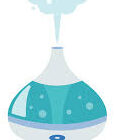How To Clean Portable Dehumidifier Coils in 3 Simple Steps
Here is How To Clean The Refrigerant Coils In Simple Steps You should know how to clean portable dehumidifier coils. We do not promise you will like the job, but someone has to do it. The good thing is that if you clean them regularly, it will become easier. Do not let the dirt accumulate … Read more




